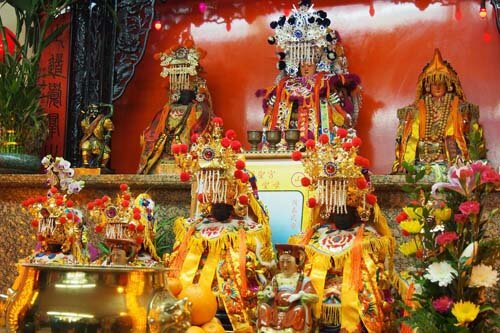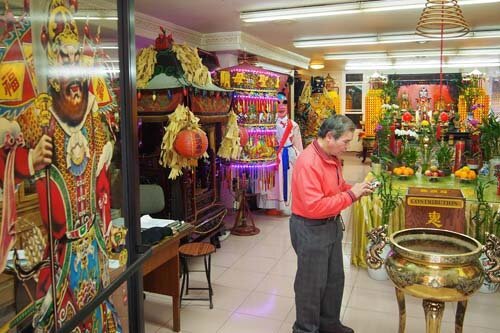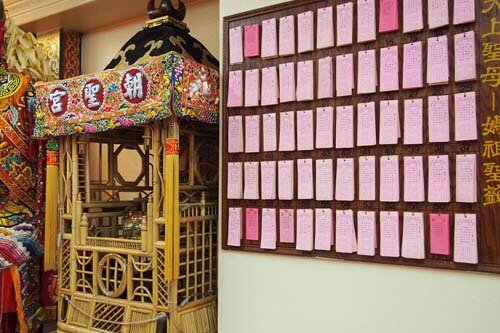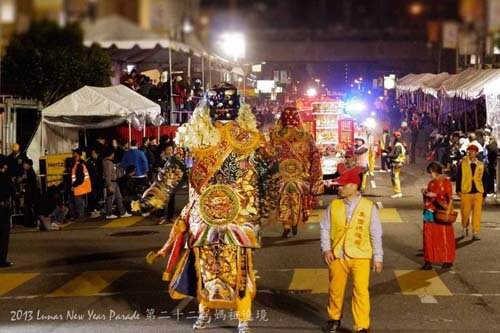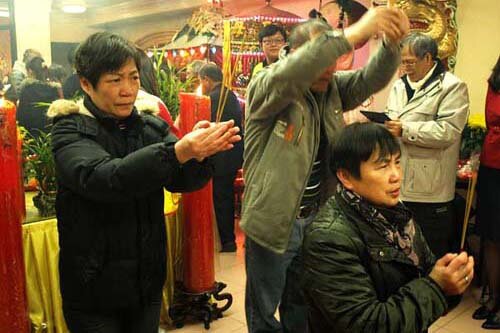On March 9, 200,000 people took to the streets in Taipei and three other major cities, demanding construction be halted on the fourth nuclear power plant, located in Gongliao at the northern tip of Taiwan. The protest in Taipei was the largest ever anti-nuclear demonstration in Taiwan. Protestors also demanded the early decommissioning of the other three nuclear power plants currently in operation and the removal of nuclear waste from Orchid Island, located off Taiwan’s southeast shore, and home mainly to aborigines.
The rallies, held in Taichung, Kaohsiung, Taitung, and Taipei, were staged as the government prepares to hold a referendum – possibly towards the end of the year – on whether to scrap the fourth nuclear plant project.
In a statement, President Ma Ying-jeou reiterated the government’s policy to move gradually toward a nuclear-free homeland, without causing power shortages or exceedingly high energy prices that would hurt Taiwan’s economy, according to the Central News Agency.
Plant viewed as a dinosaur
Taiwan’s electric power industry has been managed and monopolized by the state-owned enterprise Taiwan Power Company (Taipower). The electricity generated by Taipower’s 27 coal-fired power plants accounts for 69.4 percent of the country’s total electricity production, while 11 hydroelectric plants generate 13.8 percent and three nuclear power plants generate 15.7 percent. As for the production of renewable energy, Taipower’s 15 wind farms and three photovoltaic power plants account for less than one percent.
The life span of each nuclear plant was set at 40 years. The two generators at Plant One are scheduled to be decommissioned in 2018 and 2019 respectively, with those at Plant Two are set to retire in 2021 and 2023, and Plant Three will follow in 2024 and 2025.
On March 12, Premier Jiang Yi-huah said in the Legislative Yuan that all nuclear power plants in Taiwan will be decommissioned by 2055, based on the 40-year operating lifecycle for each nuclear power plant. According to the Central News Agency, the calculation includes the fourth nuclear power plant.
Commonwealth monthly reminded its reader that when the construction of the Taipei Mass Rapid Transportation system started, costing US$14.8 billion, and Taiwan High Speed Rail, costing US$15.3 billion, these projects were strongly criticized during their construction. Since their opening, they have greatly improved the quality of life for Taipei City residents, and are now a source of pride for all Taiwanese.
However, since construction started on Plant Four in 1997, it has met with numerous protests, and twice leading to the halting of construction. With a total cost of nearly US$11 billion, the power plant is expected to be completed by the end of this year. Over 6.5 million people, or nearly a third of Taiwan’s population, live within 50 miles of the plant. Thought of by anti-nuclear activists as a dinosaur, they are hoping Plant Four will meet the same fate and become extinct.
Tug-of-war between political parties
The Taipei-based China Times reported that nuclear power was first introduced in Taiwan 40 years ago. At the time, nuclear energy was said to be the most advanced technology in the world. However with the nuclear disasters at Three Mile Island (United States) and Chernobyl (Ukraine), making the headlines, it awoke possible safety concerns of nuclear energy among Taiwanese. The seriousness was driven home with Japan’s nuclear disaster at Fukushima in 2011.
By the end of October 2000, then President Chen Shui-bian of the Democratic Progressive Party (DPP) announced the cessation of construction on Plant Four. In January the following year, the Council of Grand Justices further explained that the suspension of construction on Plant Four was an important national policy change, so that the Executive Yuan needed to report to the Legislative Yuan in order to come up with a compromise among the parties involved.
Subsequently, an overwhelming number of votes were passed in the Kuomintang (KMT)-dominated Legislative Yuan to oppose the cancellation of Plant Four. Both the Executive Yuan and the Legislative Yuan signed an agreement to resume construction at the plant in mid-February 2001, ending a four-month delay.
To be decided by referendum
The Commercial Times noted that in the aftermath of the Japanese nuclear disaster, President Ma announced the principles of “ensuring nuclear safety, steady reduction of nuclear energy to create a green low-carbon environment so as to gradually move towards a nuclear-free homeland.” He also reassured Taiwanese by promising that the new plant would begin commercial operation only under secure conditions, the early decommissioning of Plant One, and that the lifespan of Plant Two and Three would not be prolonged.
The tide of rising voices are not only limited to the DPP now, but also to civilian organizations at the site of nuclear power plants. They have been joined by other civic groups like Mom Loves Taiwan, which consists mostly of housewives, as well as artists, celebrities and intellectuals. Premier Jiang Yi-hua, who only recently assumed office, is facing unprecedented pressure. In order to appease the growing number of opponents, on March 1, he proposed holding a national referendum to decide the fate of Plant Four.
Taiwan’s “referendum law” requires a high threshold of votes to pass it nationally. A nationwide referendum needs to have a voter turnout of more than half of the total number of people eligible to vote, and has to receive more than half of the valid votes to pass. Taiwan has had six national referendums, and none has passed.
Some consequences reconsidered
The China Times reported that the Environmental Protection Administration’s Minister Stephen Shu-hung Shen said that the immediate abolition of nuclear energy is a romantic idea, and is in conflict with the Taipei’s goal of carbon reduction.
Taiwan has made international commitments to such agreements as the Kyoto Protocol, promising to cut its carbon emissions to the 2000 level by 2025. Such a cut would reduce emissions by 90 million tons of carbon. Even with the three old nuclear plants extended passed their decommissioning dates and with Plant four online, Taiwan’s annual carbon emissions will still be 170 million tons by 2030, which far exceeds Taiwan’s international commitments of 90 million tons.
Minister Shen estimates that if Plant Four should canceled and be replaced by coal-fired plants, Taiwan’s carbon emissions would soar to 187.76 million tons, that is, 97.76 million tons over the committed carbon emissions target. He is worried that there would be 17.56 million tons more even if Plant Four started commercial operation.
Commonwealth reported that if Plant Four were scrapped and replaced by natural gas, Taiwan’s electricity generation costs would increase 40 percent. Based on the calculation of an average electricity bill of US$67 every two months, that would translate into an increase of US$27 every two months or an increase of nearly US$167 a year.
Wu Min-shuan, director of electricity development at Taipower, said the worst scenario could happen by 2024 when Plant One, Plant Two and Plant Three each have one generator decommissioned. In this situation, there will be electricity rationing island-wide if any one generator goes offline.
The goal of zero electricity growth doubted
As for the question of whether Plant One or Two will see an extension to their period of use, Tsai Chuen-horng, Minister of the Atomic Energy Council of the Executive Yuan, did not give a specific answer, but added that there have been many cases of extensions of nuclear power plants in other countries.
Irene Chen, one of the founders of Mom Loves Taiwan, an association for mothers against nuclear power, told Commonwealth that she disagrees with the idea to extend the life of Plant One and Two. She said the continuing service of nuclear power plants only increases the risks and feelings of insecurity. Besides, extensions would still continue the production of nuclear waste.
Green Citizens’ Action Alliance (GCAA) board member Chao Chia-wei said the government still predicts Taiwan’s electricity needs by using calculations based on current industrial structures. If it does not change its calculation method, there will always be a deficit, no matter how many plants are built. Therefore, the question of Taiwan’s electricity shortage depends on whether the government can develops new thinking to compensate for electricity demand.
The GCAA plans zero electricity growth by 1) reducing the ratio of electricity thirsty industries, 2) increasing the generation of renewable energy and 3) increasing the improvement of energy efficiency. With all three ways working, the energy saved would be equal to the production capability of Nuclear Power Plant Four.
Yang Jyh-shing, senior superintendent of the Industrial Technology Research Institute of Taiwan, has said that except for the United Kingdom, all other countries have failed to achieve zero electricity growth. He pointed out, “The UK has drastically reduced the proportion of industry in its economy, which is not feasible in Taiwan.”
A choice of value and lifestyle
The United Daily News commented that during the decade-long fight between the KMT and the DPP over Plant Four, the two sides never put forward a complete alternative, including the planning of alternative energy sources, the proportion of renewable energy, transition of energy-intensive industries, nor even the decommissioning schedule of nuclear power plants. If suspension of Plant Four becomes a reality, the immediate impact will be rising electricity prices. But a much bigger problem is power rationing, which will have a greater impact on daily activities. Both the ruling and opposition parties seem ill-prepared for this; while the anti-nuclear activist groups probably don’t have any answers either.
When questioned by Commonwealth on what to do if Plant Four is never operational, anti-nuclear activist Wu Wen-tong said, as a resident of Gongliao, he only cares about enjoying the beautiful ocean beach where a lot of tourists will come in the summer. When the construction of Plant Four is scrapped, people there can start their tourist and fish farming industries, reviving the local community.
Ho Ron-shin, chief editorial writer of Commonwealth, noted that the referendum on Nuclear Power Plant No. 4 serves not only as a physical examination of nuclear energy safety in Taiwan, but also a vote of confidence by the Taiwanese people on its government. It is also a value choice based on their desired lifestyle.


